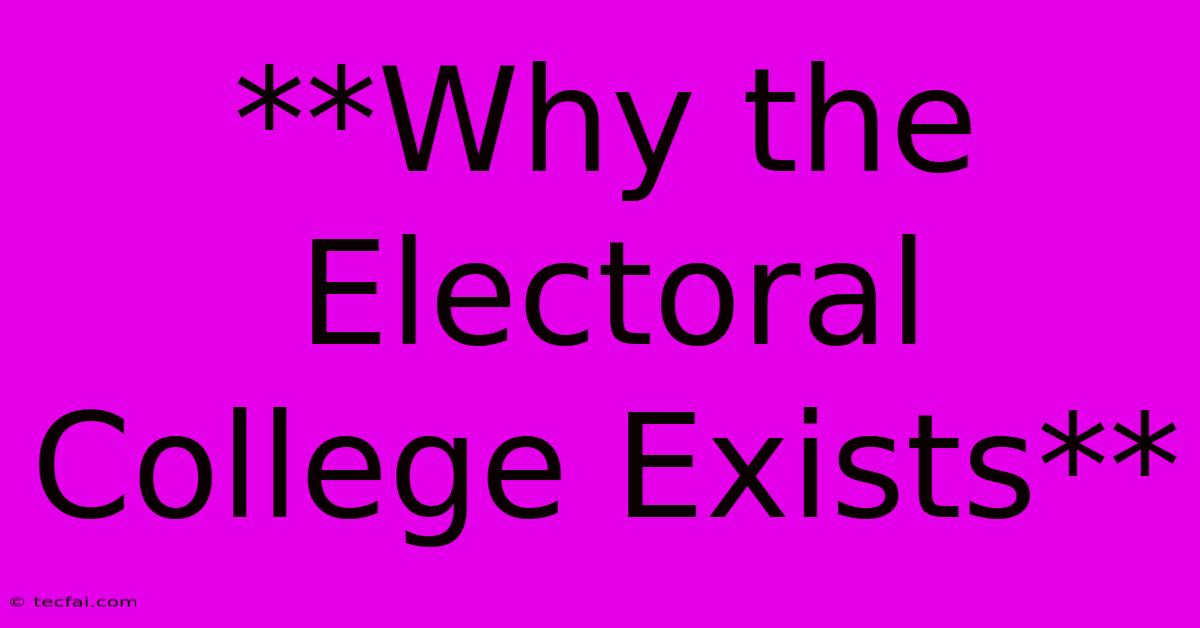**Why The Electoral College Exists**

Discover more detailed and exciting information on our website. Click the link below to start your adventure: Visit Best Website tecfai.com. Don't miss out!
Table of Contents
Why the Electoral College Exists: A Look at the Historical Context and Ongoing Debate
The Electoral College, a unique feature of the American presidential election system, often sparks passionate debate. Some argue it is an archaic system that undermines the principles of democracy, while others maintain its importance in preserving the balance of power and representing the interests of all states. To understand the rationale behind the Electoral College, we must delve into its historical context and examine the arguments for and against its continued existence.
The Founding Fathers' Concerns
The Electoral College was established by the Founding Fathers during the drafting of the U.S. Constitution in 1787. The framers were deeply concerned about the potential for tyranny and the rise of factions within a large republic. They feared that a direct popular vote could lead to the election of a president who catered solely to the interests of densely populated areas, neglecting the needs of rural and less populous states.
To address these concerns, the Electoral College system was designed with several key principles in mind:
- Preventing Tyranny: The Electoral College was intended to prevent the concentration of power in a single individual or region by ensuring that candidates needed broad support across the country to win.
- Balancing State Interests: Each state is allocated a number of electors based on its population, ensuring that even smaller states have a voice in the presidential election.
- Protection Against Mob Rule: The Electoral College was seen as a safeguard against impulsive decisions based on fleeting popular sentiment, promoting a more deliberative and reasoned approach to choosing the President.
The Electoral College in Action
The Electoral College system works as follows:
- Each state is allocated a number of electors equal to the sum of its senators and representatives in Congress.
- The District of Columbia receives three electors.
- The candidate who wins the popular vote in a state typically receives all of that state's electoral votes (with the exception of Maine and Nebraska, which use a proportional system).
- A candidate needs to win at least 270 electoral votes to be elected President.
Arguments for and Against the Electoral College
Arguments in favor of the Electoral College:
- Preservation of Federalism: The Electoral College system ensures that all states have a stake in the presidential election, preventing the dominance of large states.
- Encouragement of Broad Appeal: Candidates are incentivized to campaign nationwide and appeal to voters from diverse regions and backgrounds.
- Stability and Consensus: The system encourages candidates to build broad coalitions, fostering a sense of national unity and compromise.
Arguments against the Electoral College:
- Undemocratic Outcome: The possibility of a candidate winning the presidency despite losing the popular vote undermines the principle of "one person, one vote."
- Disenfranchisement of Minority Voters: The system can disproportionately benefit candidates who win in swing states, while voters in other states have less influence.
- Potential for Electoral Manipulation: The focus on winning swing states can incentivize candidates to prioritize certain groups of voters over others, leading to political polarization and division.
The Ongoing Debate and Future of the Electoral College
The Electoral College continues to be a subject of intense debate, with calls for reform or abolition frequently emerging. Supporters of the system argue that it safeguards the interests of smaller states and promotes a more representative form of democracy. Critics, on the other hand, emphasize the potential for undemocratic outcomes and argue that the system needs to be modernized to reflect the changing demographics and political landscape of the nation.
The debate surrounding the Electoral College highlights the enduring complexity of American democracy and the ongoing struggle to find a balance between competing interests and values. Ultimately, the fate of the Electoral College remains uncertain, with its future likely to be shaped by the evolving political and social landscape of the United States.

Thank you for visiting our website wich cover about **Why The Electoral College Exists**. We hope the information provided has been useful to you. Feel free to contact us if you have any questions or need further assistance. See you next time and dont miss to bookmark.
Featured Posts
-
Fox News Benefits From Us Election Results
Nov 06, 2024
-
Pulisics Impact Milan Takes Down Real Madrid
Nov 06, 2024
-
Hand Wash Clothes The Right Way
Nov 06, 2024
-
2024 Election Night Key Race Results
Nov 06, 2024
-
Tuna Test Only One Brand Passes
Nov 06, 2024
